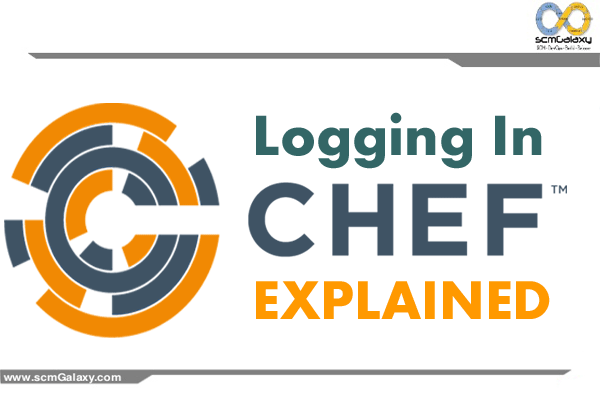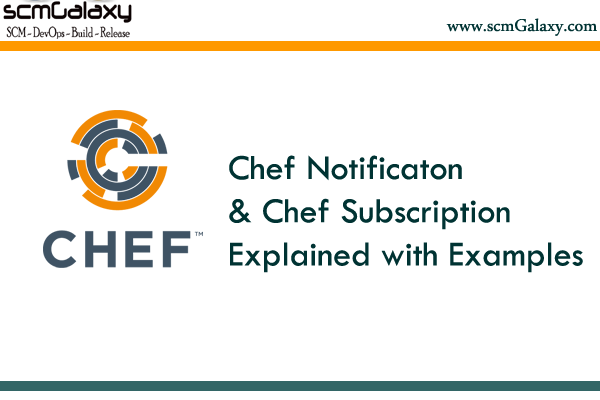week3 – Node setup, resources & recipes
week3 – Node setup, resources & recipes
rajeshkumar created the topic: How to generate the pre populated information in metadata.rb in chef?
How to generate the pre populated information in metadata.rb in chef
You can configure the values in my knife.rb:
cookbookcopyright “Rajesh Kumar”
cookbooklicense “apachev2”
cookbook_email “rajesh@scmgalaxy.com”
Regards,
Rajesh Kumar
Twitt me @ twitter.com/RajeshKumarIn
rajeshkumar created the topic: FATAL: Chef::Exceptions::ChildConvergeError: Chef run process exited unsuccessfully
FATAL: Chef::Exceptions::ChildConvergeError: Chef run process exited unsuccessfully
> knife bootstrap uvo1t75faaktzc532w6.vm.cld.sr -x root -P Br356YS0iy --sudo Doing old-style registration with the validation key at /Users/rajesh.kumar/chef-repo/.chef/scmgalaxy-validator.pem... Delete your validation key in order to use your user credentials instead Connecting to uvo1t75faaktzc532w6.vm.cld.sr uvo1t75faaktzc532w6.vm.cld.sr > Existing Chef installation detected uvo1t75faaktzc532w6.vm.cld.sr Starting first Chef Client run... uvo1t75faaktzc532w6.vm.cld.sr [2015-08-20T12:01:37-04:00] WARN: uvo1t75faaktzc532w6.vm.cld.sr * * * * * * * * * * * * * * * * * * * * * * * * * * * * * * * * * * * * * * * * uvo1t75faaktzc532w6.vm.cld.sr SSL validation of HTTPS requests is disabled. HTTPS connections are still uvo1t75faaktzc532w6.vm.cld.sr encrypted, but chef is not able to detect forged replies or man in the middle uvo1t75faaktzc532w6.vm.cld.sr attacks. uvo1t75faaktzc532w6.vm.cld.sr uvo1t75faaktzc532w6.vm.cld.sr To fix this issue add an entry like this to your configuration file: uvo1t75faaktzc532w6.vm.cld.sr uvo1t75faaktzc532w6.vm.cld.sr ``` uvo1t75faaktzc532w6.vm.cld.sr # Verify all HTTPS connections (recommended) uvo1t75faaktzc532w6.vm.cld.sr ssl_verify_mode :verify_peer uvo1t75faaktzc532w6.vm.cld.sr uvo1t75faaktzc532w6.vm.cld.sr # OR, Verify only connections to chef-server uvo1t75faaktzc532w6.vm.cld.sr verify_api_cert true uvo1t75faaktzc532w6.vm.cld.sr ``` uvo1t75faaktzc532w6.vm.cld.sr uvo1t75faaktzc532w6.vm.cld.sr To check your SSL configuration, or troubleshoot errors, you can use the uvo1t75faaktzc532w6.vm.cld.sr `knife ssl check` command like so: uvo1t75faaktzc532w6.vm.cld.sr uvo1t75faaktzc532w6.vm.cld.sr ``` uvo1t75faaktzc532w6.vm.cld.sr knife ssl check -c /etc/chef/client.rb uvo1t75faaktzc532w6.vm.cld.sr ``` uvo1t75faaktzc532w6.vm.cld.sr uvo1t75faaktzc532w6.vm.cld.sr * * * * * * * * * * * * * * * * * * * * * * * * * * * * * * * * * * * * * * * * uvo1t75faaktzc532w6.vm.cld.sr uvo1t75faaktzc532w6.vm.cld.sr Starting Chef Client, version 11.16.2 uvo1t75faaktzc532w6.vm.cld.sr uvo1t75faaktzc532w6.vm.cld.sr ================================================================================ uvo1t75faaktzc532w6.vm.cld.sr Chef encountered an error attempting to load the node data for "C2445575914.domain" uvo1t75faaktzc532w6.vm.cld.sr ================================================================================ uvo1t75faaktzc532w6.vm.cld.sr uvo1t75faaktzc532w6.vm.cld.sr Authentication Error: uvo1t75faaktzc532w6.vm.cld.sr uvo1t75faaktzc532w6.vm.cld.sr Failed to authenticate to the chef server (http 401). uvo1t75faaktzc532w6.vm.cld.sr uvo1t75faaktzc532w6.vm.cld.sr Server Response: uvo1t75faaktzc532w6.vm.cld.sr uvo1t75faaktzc532w6.vm.cld.sr Failed to authenticate as 'C2445575914.domain'. Ensure that your node_name and client key are correct. uvo1t75faaktzc532w6.vm.cld.sr uvo1t75faaktzc532w6.vm.cld.sr Relevant Config Settings: uvo1t75faaktzc532w6.vm.cld.sr uvo1t75faaktzc532w6.vm.cld.sr chef_server_url " api.opscode.com/organizations/scmgalaxy " uvo1t75faaktzc532w6.vm.cld.sr node_name "C2445575914.domain" uvo1t75faaktzc532w6.vm.cld.sr client_key "/etc/chef/client.pem" uvo1t75faaktzc532w6.vm.cld.sr uvo1t75faaktzc532w6.vm.cld.sr If these settings are correct, your client_key may be invalid, or uvo1t75faaktzc532w6.vm.cld.sr you may have a chef user with the same client name as this node. uvo1t75faaktzc532w6.vm.cld.sr uvo1t75faaktzc532w6.vm.cld.sr [2015-08-20T12:01:41-04:00] FATAL: Stacktrace dumped to /var/chef/cache/chef-stacktrace.out uvo1t75faaktzc532w6.vm.cld.sr Chef Client failed. 0 resources updated in 3.598799916 seconds uvo1t75faaktzc532w6.vm.cld.sr [2015-08-20T12:01:41-04:00] ERROR: 401 "Unauthorized" uvo1t75faaktzc532w6.vm.cld.sr [2015-08-20T12:01:41-04:00] FATAL: Chef::Exceptions::ChildConvergeError: Chef run process exited unsuccessfully (exit code 1)
Regards,
Rajesh Kumar
Twitt me @ twitter.com/RajeshKumarIn
rajeshkumar replied the topic: FATAL: Chef::Exceptions::ChildConvergeError: Chef run process exited u
I just login to the nodes and deleted all files under /etc/chef/ and rerun the commands and worked like charm.
Regards,
Rajesh Kumar
Twitt me @ twitter.com/RajeshKumarIn
rajeshkumar created the topic: Configuration management chef tools projects to test your skills?
Project 1 – Write a cookbook which can add your bash script in crontab on your nodes.
Project 2 – Perforce the following workflow of chef configuration management tools?
— create a new cookbook and add a recipe to it
— upload your cookbook to the Chef server
— configure your node’s run list
— run chef-client to trigger the configuration process on your target node
Project 3 – Write a cookbook with external cookbook_files in Chef?
Project 4 – Write a cookbook which can Set Chef Cookbook Dependencies in metadata file and use it?
Project 5 – Write a cookbook add jenkins slave nodes in jenkins master server using Chef cookbook?
Project 6 – Write a cookbook to configure nginx with chef solo on vagrant?
Project 7 – Write a cookbook to Setting up a MySQL database with a user with Vagrant and chef-solo?
Project 8 – Write a cookbook to track changes made to systems via knife in chef?
Regards,
Rajesh Kumar
Twitt me @ twitter.com/RajeshKumarIn
rajeshkumar created the topic: FATAL: Chef::Exceptions::ChildConvergeError: Chef run process exited u
FATAL: Chef::Exceptions::ChildConvergeError: Chef run process exited unsuccessfully (exit code 1)
Error
gitlab-ctl reconfigure
Starting Chef Client, version 11.12.2
Compiling Cookbooks...
Recipe: gitlab::default
* directory[/etc/gitlab] action create (up to date)
================================================================================
Recipe Compile Error in /opt/gitlab/embedded/cookbooks/gitlab/recipes/default.rb
================================================================================
RuntimeError
------------
External URL must include a FQDN
Cookbook Trace:
---------------
/opt/gitlab/embedded/cookbooks/gitlab/libraries/gitlab.rb:95:in `parse_external_url'
/opt/gitlab/embedded/cookbooks/gitlab/libraries/gitlab.rb:191:in `generate_config'
/opt/gitlab/embedded/cookbooks/gitlab/recipes/default.rb:34:in `from_file'
Relevant File Content:
----------------------
/opt/gitlab/embedded/cookbooks/gitlab/libraries/gitlab.rb:
88:
89: def parse_external_url
90: return unless external_url
91:
92: uri = URI(external_url.to_s)
93:
94: unless uri.host
95>> raise "External URL must include a FQDN"
96: end
97: Gitlab['user']['git_user_email'] ||= "gitlab@#{uri.host}"
98: Gitlab['gitlab_rails']['gitlab_host'] = uri.host
99: Gitlab['gitlab_rails']['gitlab_email_from'] ||= "gitlab@#{uri.host}"
100:
101: case uri.scheme
102: when "http"
103: Gitlab['gitlab_rails']['gitlab_https'] = false
104: when "https"
Running handlers:
[2014-11-03T12:38:40+05:30] ERROR: Running exception handlers
Running handlers complete
[2014-11-03T12:38:40+05:30] ERROR: Exception handlers complete
[2014-11-03T12:38:40+05:30] FATAL: Stacktrace dumped to /opt/gitlab/embedded/cookbooks/cache/chef-stacktrace.out
Chef Client failed. 0 resources updated in 3.925307977 seconds
[2014-11-03T12:38:40+05:30] ERROR: External URL must include a FQDN
[2014-11-03T12:38:41+05:30] FATAL: Chef::Exceptions::ChildConvergeError: Chef run process exited unsuccessfully (exit code 1)
more /etc/gitlab/gitlab.rb
# Check and change the external_url to the address your users will type in their browser
external_url ‘hostname:9999’
unicorn = 9090
Log file
Dumped to
/opt/gitlab/embedded/cookbooks/cache/chef-stacktrace.out
OS
RHEL 6.5
Regards,
Rajesh Kumar
Twitt me @ twitter.com/RajeshKumarIn
rajeshkumar replied the topic: FATAL: Chef::Exceptions::ChildConvergeError: Chef run process exited u
Solved after
hostname.dev.corp.local:9999
Regards,
Rajesh Kumar
Twitt me @ twitter.com/RajeshKumarIn
rajeshkumar replied the topic: FATAL: Chef::Exceptions::ChildConvergeError: Chef run process exited u
I am still not able to access the gitlab url from browsers…with following info….
gitlab-ctl show-config
Starting Chef Client, version 11.12.2
Compiling Cookbooks…
{
“gitlab”: {
“bootstrap”: {
},
“user”: {
},
“redis”: {
},
“gitlab-rails”: {
“secret_token”: “f276844818b47932ab27c670536111f68d4ad8d84e3d02a42a0f8be23e00c78a0094f62efbd08655f3430a9524258f39b82281e10d52c391c2e751f5747d45dc”
},
“gitlab-shell”: {
},
“unicorn”: {
“port”: 9090
},
“sidekiq”: {
},
“nginx”: {
},
“logging”: {
},
“remote-syslog”: {
},
“logrotate”: {
},
“high-availability”: {
},
“postgresql”: {
},
“web-server”: {
}
}
}
Converging 0 resources
Running handlers:
Running handlers complete
Chef Client finished, 0/0 resources updated in 10.57749914 seconds
gitlab-ctl status
run: logrotate: (pid 19510) 136s; run: log: (pid 10239) 4278s
run: nginx: (pid 20043) 2s; run: log: (pid 9765) 4365s
run: postgresql: (pid 19516) 135s; run: log: (pid 9569) 4393s
run: redis: (pid 19524) 135s; run: log: (pid 9432) 4475s
run: sidekiq: (pid 19529) 134s; run: log: (pid 9712) 4371s
run: unicorn: (pid 19534) 134s; run: log: (pid 9664) 4377s
more /etc/gitlab/gitlab.rb
external_url = ‘xysudyd.dev.corp.local:9999’
unicorn = 9090
Regards,
Rajesh Kumar
Twitt me @ twitter.com/RajeshKumarIn

Chef Server
All logs generated by the Chef server can be found in /var/log/opscode. Each service enabled on the system also has a sub-directory in which service-specific logs are located, typically found in /var/log/opscode/service_name.
The Chef server has built-in support for easily tailing the logs that are generated. To view all the logs being generated on the Chef server, enter the following command:
> chef-server-ctl tail
To view logs for a specific service:
> chef-server-ctl tail SERVICENAME
where SERVICENAME should be replaced with name of the service for which log files will be viewed. SERVICENAME represents the name of any service that is listed after running the “> chef-server-ctl service-list” subcommand.
Another way to view log files is to use the system utility tail:
> tail -50f /var/log/chef-server/opscode-chef/current
> tail -50f /var/log/opscode/opscode-chef/current
Supervisor Logs
Supervisor logs are created and managed directly by the service supervisor, and are automatically rotated when a the current log file reaches 1,000,000 bytes. 10 log files are kept. The latest supervisor log is always located in /var/log/chef-server/service_name/current and rotated logs have a filename starting with @ followed by a precise tai64n timestamp based on when the file was rotated.
Supervisor logs are available for the following services:
The nginx service creates both supervisor and administrator logs. The administrator logs contain both access and error logs for each virtual host utilized by the Chef server. Each of the following logs require external log rotation.
| Logs | Description |
|---|---|
| /var/log/opscode/nginx/access.log | The Web UI and API HTTP access logs. |
| /var/log/opscode/nginx/error.log | The Web UI and API HTTP error logs. |
| /var/log/opscode/nginx/internal-account.access.log | The opscode-account internal load-balancer access logs. |
| /var/log/opscode/nginx/internal-account.error.log | The opscode-account internal load-balancer error logs. |
| /var/log/opscode/nginx/internal-authz.access.log | The opscode-authz internal load-balancer access logs. |
| /var/log/opscode/nginx/internal-authz.error.log | The opscode-authz internal load-balancer error logs. |
| /var/log/opscode/nginx/internal-chef.access.log | The opscode-chef and opscode-erchef internal load-balancer access logs. |
| /var/log/opscode/nginx/internal-chef.error.log | The opscode-chef and opscode-erchef internal load-balancer error logs. |
| /var/log/opscode/nginx/nagios.access.log | The nagios access logs. |
| /var/log/opscode/nginx/nagios.error.log | The nagios error logs. |
| /var/log/opscode/nginx/rewrite-port-80.log | The rewrite logs for traffic that uses HTTP instead of HTTPS. |
To follow the logs for the service:
$ chef-server-ctl tail nginx
Chef Client
Client.rb3 file might help you. Default value of log_location is STDOUT. You can give /path/to/log_location in place of this. You can locate this client.rb file in C:\chef\client.rb or /etc/chef/client.rb directories.
Use the verbose logging that is built into the chef-client:
-l LEVEL, –log_level LEVEL
The level of logging to be stored in a log file.
-L LOGLOCATION, –logfile c
The location of the log file. This is recommended when starting any executable as a daemon. Default value: STDOUT.
Knife
Use the verbose logging that is built into knife:
-V, –verbose
Set for more verbose outputs. Use -VV for maximum verbosity.
chef-solo
-l LEVEL, –log_level LEVEL
The level of logging to be stored in a log file.
The Chef file and folder locations are different on Linux and Windows machines. This article explains the purpose of each file and the location.
| Linux | Windows | |
|---|---|---|
| Cookbook location | /var/chef/cache/cookbooks | C:\chef\cache\cookbooks |
| Chef Client run log | /var/log/chef.log | First run only C:\chef\chef-client.log |
| Subsequent Chef client runs C:\chef\log\client.log |
||
| Error log | /var/chef/cache/chef-stacktrace.out | C:\chef\cache\chef-stacktrace.out |
| Ohai output | /var/chef/cache/failed-run-data.json | C:\chef\cache\failed-run-data.json |
| Recommended location for custom log files | /tmp/cheflog.log | C:\Logs\Chef\cheflog.log |
| Chef Client configuration | /etc/chef/client.rb | C:\chef\client.rb |
The .kitchen.yml file contains the username to execute the Chef cookbook. It is specified under platforms:, transport:, username:
Use that value in place of USER-NAME-FROM-KITCHEN-YML below.
| Linux | Windows | |
|---|---|---|
| Cookbook location | /tmp/kitchen/cookbooks /tmp/kitchen/cache/cookbooks |
C:\Users\USER-NAME-FROM-KITCHEN-YML\AppData\Local\Temp\kitchen\cookbooks |
| Error log | /tmp/kitchen/cache/chef-stacktrace.out | C:\Users\USER-NAME-FROM-KITCHEN-YML\AppData\Local\Temp\kitchen\cache\chef-stacktrace.out |
| Ohai output | /tmp/kitchen/cache/failed-run-data.json | C:\Users\USER-NAME-FROM-KITCHEN-YML\AppData\Local\Temp\kitchen\cache\failed-run-data.json |
| Data bags | /tmp/kitchen/data_bags | C:\Users\USER-NAME-FROM-KITCHEN-YML\AppData\Local\Temp\kitchen\data_bags |
Cookbook location
When the Chef recipes are executed, all cookbooks are stored on the node. You can examine the code to make sure your latest changes are reflected on the machine.
The log of the Chef client run
The output of the Chef cookbook execution is in the chef.log or chef-client.log file
On Windows
The log of the first Chef Client run and subsequent runs are stored in different log files. After the initial Chef Client run, the rest of the log entries are collected in the second file.
Stacktrace
Chef saves information on the hard drive when scripts are executed. If there is a failure, the stack trace of the last error is saved in the chef-stacktrace.out file.
Ohai output
All the information that Ohai collects on the instance, is saved in the failed-run-data.jsonfile, even if there is no error. It is a great resource to get the server specific values.
Reference
https://docs.chef.io/server_logs.html
https://docs.chef.io/debug.html
